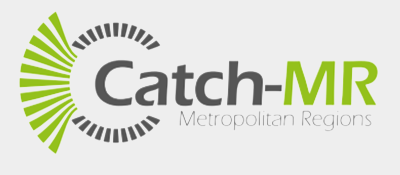

Project name: CATCH-MR (Cooperative Approaches to Transport CHallenges in Metropolitan Regions)
Project Acronym: CATCH-MR
Duration: 01.01.2010. – 31.12.2012.
Description:
Seven European metropolitan regions exchanged experiences on the following topics:
- How can personal transportation between the metropolis and its surrounding region be reduced without restricting mobility?
- How can alternatives to individual transportation become more attractive?
- How can the proportion of environmentally friendly technologies in transportation be increased?
The aim of the project is to improve the quality of life and competitiveness of metropolitan regions. To achieve this goal, it is necessary to strengthen efficient and environmentally friendly personal transportation services between cities and their surrounding areas. The project serves as a good example of sustainable regional and transport development in the participating metropolitan regions and also examined the applicability of these results in other regions.
The efficient, reliable, and sustainable nature of transportation is one of the key conditions for economic growth. This is especially true for metropolitan regions, which act as engines of regional development. Metropolitan regions are central hubs for local, regional, and international transportation, and they must manage the ever-growing demands on transportation.
Metropolitan regions face significant challenges in developing transportation infrastructures and organizing services. In addition to financial requirements, they must also consider issues related to demographic changes and meet expectations concerning environmental and climate protection. In the future, lessons learned from successful examples could help foster better cooperation between European metropolitan areas and the stakeholders involved in urban development.
The participants of the CATCH-MR project organized an exchange of experiences between metropolitan regions, provided information, and made recommendations in the following areas:
- Reducing transportation demand, with a particular focus on coordinating urban development and transportation planning;
- Modal shift (intermodality), especially increasing the attractiveness of local public transportation;
- Increasing the use of efficient and low-emission technologies in both individual and public transportation.
Based on the experiences, applying an integrated approach is particularly important when examining the following issues:
- The causes of urban sprawl and possible intervention tools;
- Enhancing the attractiveness of local public transportation by providing better framework conditions;
- Promoting the more intensive use of renewable energy sources in passenger transport by developing affordable technologies and the necessary infrastructure;
- Strengthening planning cooperation between metropolitan areas and their surrounding regions.
Lead partner: Joint Spatial Planning Department (JSP) of Berlin-Brandenburg
Projektmenedzser: Frank Segebade
Partners: Ljubljana Urban Region Development Agency, Slovenia;
Research Center of the Slovenian Academy of Sciences and Arts, Slovenia;
City of Oslo, Norway;
Akershus County Council, Norway;
Association of Municipalities in the Gothenburg Region, Sweden;
Municipality of Budapest, Mayor's Office, Hungary;
BKK Centre for Budapest Transport, Hungary;
City of Vienna, Austria;
Lower Austria Provincial Government, Austria;
Province of Rome, Italy;
Business Innovation Centre (BIC) Lazio, Italy;
Project budget: 2.004.602 €, BKK budget in project: 57.686 €
Grant Agreement number: 0619R2
Funded by: European Union's Interreg IVC Program (85%) and the Hungarian State (10%)
BKK’s role in the project: Project partner



